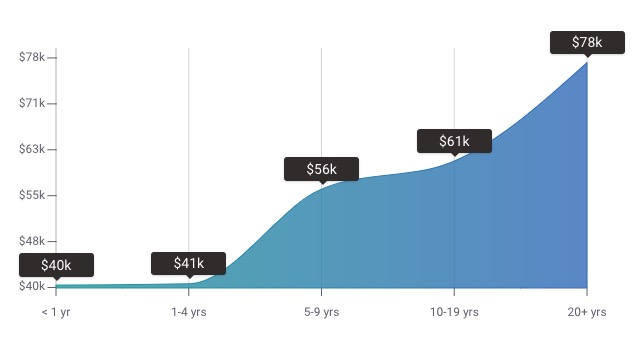PC specialists are computer experts who help users set up their computer systems or troubleshoot problems. They may help clients in a company setting or an individual in their home. They install software and connect computers and printers to the Internet. They take care of routine maintenance and software updates and fix any local area network or wide area network issues that may prevent computers from connecting to each other.
The following chart gives you what you need to know about starting this career field.
| Education Required | Associate degree; Bachelor’s degree preferred |
| Education Field of Study | Computer science, Information systems, Computer engineering |
| Key Responsibilities | Installing software, running diagnostics, resolving network issues |
| Certification | Optional certification available |
| Job Growth (2018-2028) | 10% (for all computer support specialists)* |
| Median Salary (2018) | $53,470 (for all computer support specialists)* |
Sources: *U.S. Bureau of Labor Statistics
What Will I Do As A PC Specialist?
As a PC specialist, you’ll provide technical support to users of personal computers, or PCs. This technical support may take the form of troubleshooting, maintenance or repair, and may take place in person, over the phone or via e-mail. Some PC support services may be preventative in nature, like running antivirus software or clearing up file space to keep desktop computers running smoothly.
In other cases, your work as a PC specialist may require you to diagnose or fix a problem that already exists, such as inoperable computer software or a non-working printer. You may also provide step-by-step support to PC users as they install new programs, run diagnostic tests, set up desktop computers and so on.
What Are Some Common Working Environments?
According to the U.S. Bureau of Labor Statistics (BLS), most PC support specialists work in office environments, but exact job title and duties may vary depending on your job title and place of employment (www.bls.gov). As a technical support specialist, you’ll work for a firm or corporation and be responsible for helping employees with any computer-related issues that may arise.
In addition to troubleshooting and maintenance, you may install programs or updates on office PC’s and offer tutorials or instructions on new computer programs or features. If help desk technician is your job title, you’ll provide phone or e-mail assistance to customers who call in seeking resolution to various PC problems. In this position, you may work for a computer manufacturer, software company or a technical support consulting firm.
What Training Is Required?
Exact training requirements for PC specialists vary from one workplace to the next. In order to obtain a tech support or help desk position, you’ll probably need relevant experience, college education – though not necessarily a 4-year degree – or some combination thereof. An associate’s or bachelor’s degree in computer science or a related area may be required for some positions and preferred, but not required, for others. If your educational background is in another area, but you’d like to break into the technical support industry, you can earn a certificate in information technology or PC support.
In a computer science degree or certificate program, you’ll learn about personal computer hardware, software, programming and networking. Course curricula vary, but most programs cover the general structure, setup and applications of those four areas. You’ll also take courses more specific to your profession of interest, such as help desk support or hardware and application troubleshooting.
In bachelor’s degree programs, your courses may also cover advanced topics like Internet and software programming codes, database management, information security and algorithm design. After finishing college, you can keep up with industry trends through continuing education; professional associations like the Institute of Electrical and Electronics Engineers (IEEE) Computer Society offer numerous relevant courses, conferences and workshops (www.computer.org).
What Is My Salary Potential?
As of May 2018, the BLS reported a median annual wage of $53,470 for computer support specialists. For help desk technicians, the salary information website Payscale.com reported an estimated national annual salary range of $31,000-$56,000 for the middle 50% of workers surveyed as of November 2019. Payscale.com also broke down earnings by years of experience. For example, technical support specialists with under 5 years of experience made a salary of $17.01 per hour, while those with 10-20 years of experience earned $22.40 per hour. As of November 2019, entry-level help desk technicians earned $15.18 per hour, compared to $20.27 per hour for technicians with 20 or more years of experience (www.payscale.com).
What Are Some Related Alternative Careers?
If you are interested in other computer-related careers that require a bachelor’s degree, you might consider becoming a computer and information systems, manager, a computer systems analyst or a software developer. Information systems managers are responsible for the organization and implementation of a company’s information system. Computer systems analysts look at an existing information network system and make recommendations for changes to the system that will make it run more efficiently. Software developers design programs that run applications and other computer programs, and they may sometimes write the actual code that makes these programs run.






